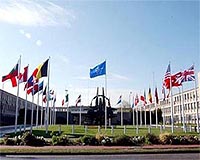| . |  |
. |
Arlington, Va. (UPI) May 19, 2009 The U.S. Army alone could not have kept the national ammunition industrial base of the United States working. The private companies that have managed the government-owned but contractor-operated plants have shown themselves to be very responsible when it comes to sustaining the United States' ammunition industrial base. Alliant Techsystems, or ATK, played a significant role in modernization efforts at the Radford Army Ammunition Plant in Virginia both through its own activities and in partnership with the U.S. Army. Managing ammunition plants requires special skills. ATK brought to Radford a wealth of experience that served that facility and the entire U.S. ammunition-manufacturing industrial base well. Modernizing the acid plant at Radford is key to its ability to ensure production of nitrocellulose. As is quite common in the environment of U.S. government-owned but contractor-operated companies, known as GOCOs, the private sector makes significant investments in upgrading activities at the facilities they manage. For example, ATK also invested in improvements to the operations at Radford. It has spent some $40 million over the past five years on a variety of projects at the plant, including the modern energetics facility. It relocated some of its other ammunition-production contracts to Radford as well as additional defense and non-defense activities by other private companies, helping to spread the indirect cost of the facility more broadly. Similarly, BAE Systems has invested some $21 million since fiscal year 2000 at the Holston plant in Kingsport, Tenn., on a refurbished power plant, enhanced laboratories and modernized production facilities. However, much still needs to be done to expand on these achievements. In the National Defense Authorization Act for fiscal year 2009, the Armed Services Committee of the U.S. Senate noted the absence of long-range planning for the recapitalization and modernization of U.S. Army ammunition plants and arsenals nationwide. The Senate Armed Services Committee said that "in many cases, these ammunition plants and arsenals, operating in facilities that have not been upgraded in decades, serve as the sole producer of critical components that are absolutely essential to the mission of the Department of the Army." In its conclusions and mandated legislation, the committee required the secretary of the Army to develop a comprehensive long-range plan for each ammunition plant and arsenal. The Army is planning now for the likely downturn in defense budgets and the resulting reduction in funding for ammunition. It has set very sensible goals for this sector of the defense industrial base of the United States.
(Daniel Goure is vice president of the Lexington Institute, an independent think tank in Arlington, Va.)
(United Press International's "Outside View" commentaries are written by outside contributors who specialize in a variety of important issues. The views expressed do not necessarily reflect those of United Press International. In the interests of creating an open forum, original submissions are invited.)
Related Links The Military Industrial Complex at SpaceWar.com Learn about the Superpowers of the 21st Century at SpaceWar.com
 NATO In The Early 21st Century: Part Six
NATO In The Early 21st Century: Part SixWashington (UPI) May 19, 2009 As the first decade of the 21st century ends, the European member states of the North Atlantic Treaty Organization are moving in a somewhat leisurely manner to modernize their already technically advanced weaponry with more high-tech systems. But they are making no moves to increase the size of their military establishments. On the contrary, French President Nicolas Sarkozy, whose natio ... read more |
|
| The content herein, unless otherwise known to be public domain, are Copyright 1995-2009 - SpaceDaily. AFP and UPI Wire Stories are copyright Agence France-Presse and United Press International. ESA Portal Reports are copyright European Space Agency. All NASA sourced material is public domain. Additional copyrights may apply in whole or part to other bona fide parties. Advertising does not imply endorsement,agreement or approval of any opinions, statements or information provided by SpaceDaily on any Web page published or hosted by SpaceDaily. Privacy Statement |